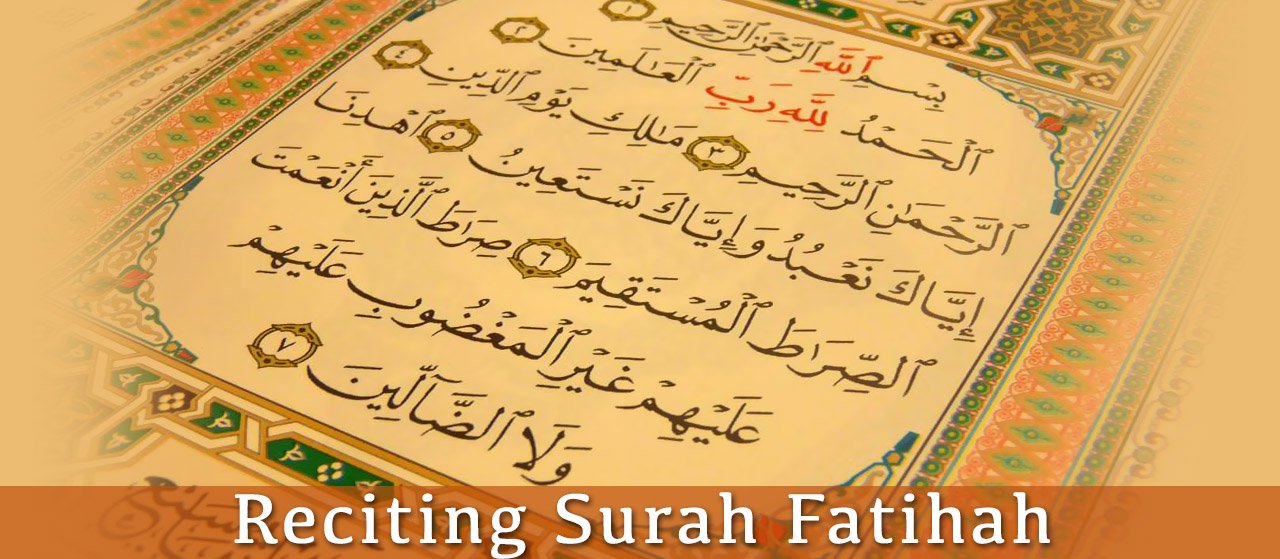The Ruling of Reciting Surah Fatihah in Prayer
The opinion of the majority of the scholars, amongst them Malik, Ash-Shafi’i and Ahmad, is that it is obligatory to recite Al-Fatihah in the prayer and that the prayer is invalid without it. Their opinion is based upon many proofs; from amongst them, the sayings of the Prophet (sallallahu ‘alayhi wa sallam), who said that “There is no prayer for the one who does not recite the Opening of the Book.”
Narrated ‘Ubâdah bin As-Sâmit Allâh’s Messenger said,
“Whoever does not recite Sûrat Al-Fâtihah in his prayer, his prayer is invalid. (Sahih Al-Bukhâri, Vol.1, Hadîth No. 723).
However, Abu Hanifa and some others had differing opinions on this.
In the case where one is a follower in a congregational prayer then the scholars fell into three opinions with regards to his reciting “Al-Fatiha,”:
1. It is obligatory upon him to recite it in all prayers.
2. It is upon him not to recite it in all prayers.
3. He should recite it in those prayers in which the recitation is silent, but not in those prayers in which the recitation is loud.
Composition of Surah Fatihah
It consists of seven verses and there is no difference of opinions concerning this.. Scholars have differed concerning the statement “Bismillah-ir-Rahman-ir-Raheem” ”(with the Name of Allah, the All-Merciful, the Most Merciful.”
“The majority of the reciters of Kufa postulate that the “verse of Bismillah” comprises an independent verse of Al-Fatihah and this is also the opinion of a group of the Sahabah, Tabi’in and a large group of the later scholars. However the reciters and jurists of Madinah regard it to be part of a verse, and not an independent verse, or not a verse at all.
Those who postulate that “Bismillah” is not a verse of Al-Fatihah state that the seventh verse commences with the words, “not [the path] of those who have earned [Your] Anger … ” (This is because there is no disagreement that Surah Al-Fatihah has seven verses.)
The Virtues of Surah Fatihah
There are a number of ahadith explaining to us the great virtue of this surah. They are summarized as follows: Allah responds to the believer when he recites Surah Al-Fatiah.
Sahih Muslim records on the authority of Abu Hurayrah (R) who said that the Messenger of Allah (sallallahu ‘alayhi wa sallam) said,
“Allah, the Glorious and Exalted said, “I have divided the prayer between Myself and my servant equally and My servant shall be granted what he asked for.”
Therefore, when the servant says, ‘All praises and thanks are due to Allah, the Lord of the worlds’, Allah says, ‘My servant has praised Me.’
When he says,’The All-Merciful, the Most Merciful,’Allah says, ‘My servant has extolled Me.’
When he says, ‘Master of the Day of Judgment,’ Allah says, ‘My servant has glorified Me.’
When he says, ‘You Alone we worship and Your aid Alone do we seek,’ Allah says, ‘this is between Me and My servant and My servant shall have what he requested.’
When he says, ‘Guide us to the Straight Path, the Path of those whom You have favored, not [the path] of those who have earned [Your] anger, nor of those who have gone astray,’ Allah says, ‘this is for My servant and My servant shall have what he asked for.’



For latest information you have to visit the web and on world-wide-web I found this site
as a most excellent site for newest updates.